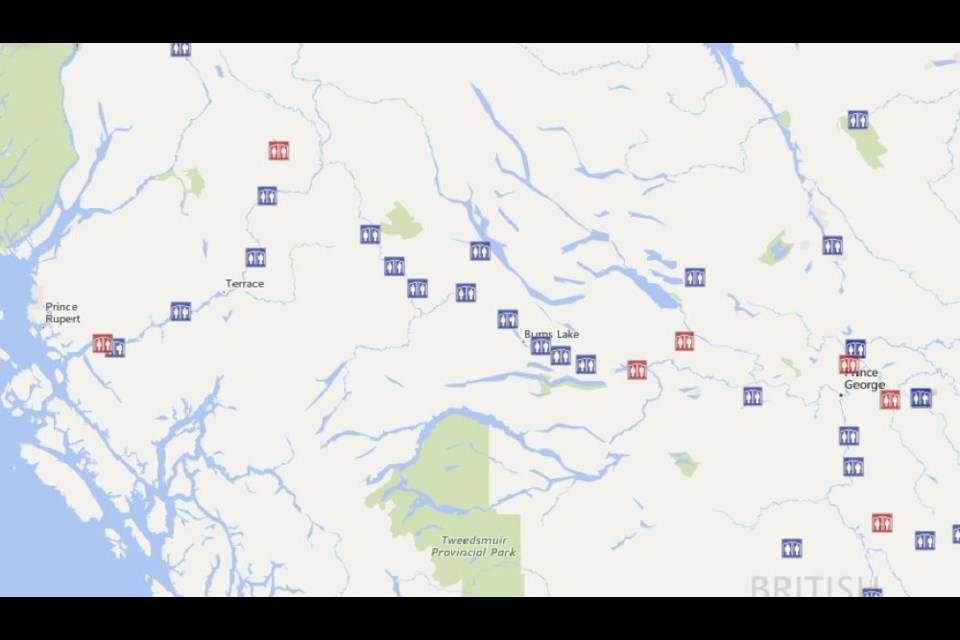Imagine being a truck driver hauling fuel from Prince George to Prince Rupert, and it’s 2 a.m. and 40 below, and the only place to go is an outhouse with no heat and no light.
These are the challenges Rob Olsen, and other truck drivers just like him, face each time they take to the highways of B.C.
Olsen has driven the 720-kilometre route on Highway 16 on and off for 38 years and had some hope that when the newly built $34.3 million Terrace Commercial Vehicle Inspection Station was opened recently that more civilized amenities would be included for long haulers.
But there, on the perimeter of the state-of-the-art indoor inspection complex, stood an outhouse, with no light and no heat, for the truck drivers’ use. Olsen knows there’s indoor plumbing not 200 feet away but that’s only available during office hours and that’s not when most truckers’ route times are scheduled.
“When they’re building these places it would be nice if they thought of us truck drivers,” Olsen said.
Trucking is considered an essential service, a critical component of the supply chain, with drivers delivering food and goods necessary to every person throughout Canada at all times of the day and night to meet demand. In 2020, road transport accounted for 50 per cent of Canada’s merchandise trade (imports and exports combined). Another 23 per cent is moved by water, 15 per cent by air, and 12 per cent by rail, according to the National Supply Chain Task Force Final Report published in 2022.
“A lot of us knew before the pandemic how important truckers were to our daily lives and that became even more profound how we relied on them to survive as the truckers were bringing groceries to the stores when nobody else could move so we appreciate our truckers,” said MP Bob Zimmer (Prince George – Peace River – Northern Rockies).
“I guess this goes with the provincial government spending British Columbians out of house and home and it falls in line with the federal government doing the same. We’ve never seen two governments provincially and federally that have spent as much money as these two governments have and yet they seem to still not show respect to the backbone workers of our community. I would say it shows that this current government disregards that importance and they shouldn’t. They should respect our truckers and respect the people that make our world turn around every day.”
On the Prince George to Prince Rupert route only two rest areas of the 14 that can accommodate big trucks have flush toilets available 24 hours, including at Cluculz Lake, west of Prince George, and Palling, west of Burns Lake.
“There are no lights in most of the outhouses,” Olsen said. “There are power lines right above the outhouses but they can’t seem to provide light. This is 2024, not 1950.”
A new rest area near Endako called Savory West, 83 km west of Vanderhoof, was just built that includes four pit toilets (outhouses) and three electric vehicle charging stations.
“And again it’s outhouses with no lights and a powerline just above the roof and even if they didn’t do power, they could’ve put solar in,” Olsen said. “And there are no facilities to wash up and I just get tired of it. It’s been that way for so long that I guess after a while you just accept that that’s the way it is.”
But he doesn’t want to do that any more and decided to speak out, he added.
“I know a lot of people haven’t thought about this but I feel like it’s discrimination,” Olsen said. “We’re the ones going up and down the highway hauling goods for everybody – what happens if we all quit? You’ll all starve to death and you’ll have to get back on your horse or your bicycle to get around – I haul your fuel. I just want a little recognition, I guess. And I don’t think it’s too much to ask that we have a place to wash our hands after we do our business.”
Olsen reached out to the office of the B.C. Ministry of Transportation before reaching out to The Citizen but did not get a response.
When The Citizen reached out to the Ministry of Transportation and Infrastructure this is the response that was received:
“The inspection station east of Terrace offers several benefits to long-haul commercial drivers, including additional parking spaces designated for rest. Washrooms with flushable toilets are available to drivers at the scale building during office hours. Local service stations in nearby Thornhill also provide standard facilities and amenities.
“Upgrades and enhancements to key highway rest areas are planned as part of a multi-year plan to improve safety, accessibility and other amenities along B.C.’s highways through a $100-million Safety Rest Area Improvement Program to support the trucking industry and other travellers.
“The province is currently reviewing and updating its rest area management plan to evaluate current needs and help guide future improvement projects across the provincial highway network.
“In the Northern Region, the ministry is currently focusing on access improvements, accessibility enhancements, and lighting and signage upgrades, to existing rest areas along key corridors such as Highway 16 and Highway 97.
“The ministry has made several improvements in recent years, including upgrades to the Cluculz Rest Area on Highway 16, east of Vanderhoof, and the Savory Rest Area, west of Endako. Upgrades are also currently underway at the Mile 80 Rest Area on Highway 97, north of Fort St. John.



